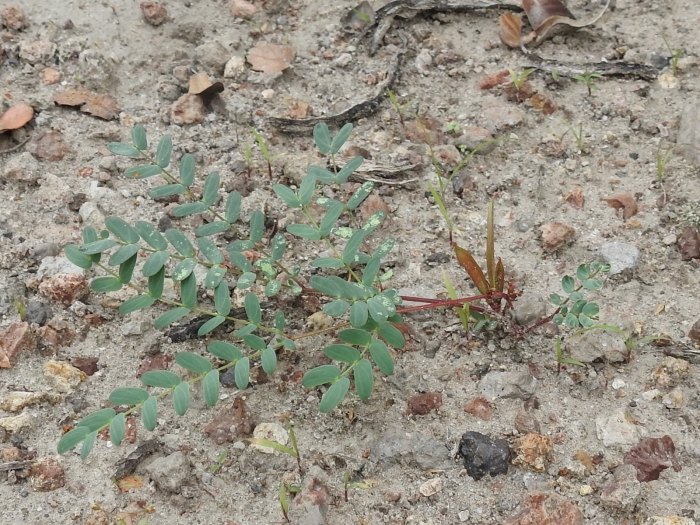Dwarf Stickpea
(Calliandra humilis)
Dwarf Stickpea (Calliandra humilis)
/
/

Sam Kieschnick
CC BY 4.0
Image By:
Sam Kieschnick
Recorded By:
Copyright:
CC BY 4.0
Copyright Notice:
Photo by: Sam Kieschnick | License Type: CC BY 4.0 | License URL: http://creativecommons.org/licenses/by/4.0/ | Rights Holder: Sam Kieschnick | Publisher: iNaturalist | Date Created: 2017-08-20T03:20:56-07:00 |















Estimated Native Range
Summary
Calliandra humilis, commonly known as Dwarf Stickpea, is a deciduous perennial subshrub or herb native to a variety of habitats including open woodlands, grasslands, and pine-oak forests in the Southwestern United States and Northern and Central Mexico. It typically reaches a modest height of 0.7 feet (0.2 meters) and a similar width of 0.5 feet (0.2 meters), making it a low-growing plant with a compact form. The Dwarf Stickpea is notable for its delicate, bipinnate leaves and produces clusters of cream to pale pink flowers with long, showy stamens that resemble powder puffs, blooming primarily in the summer months.
This plant is valued for its low maintenance requirements and its ability to attract pollinators such as bees and butterflies, making it a beneficial addition to xeriscapes and pollinator gardens. It is often used in rock gardens, as a ground cover, or in border plantings due to its small size and ornamental flowers. Dwarf Stickpea thrives in full sun and requires well-drained soils, tolerating both medium and fast drainage. While it prefers regular watering, it is drought-tolerant once established. There are no widely recognized cultivars of this species in the horticultural trade, but its natural charm makes it a desirable plant for naturalistic landscapes. Potential problems include overwatering, which can lead to root rot, and it may be sensitive to frost in colder climates.CC BY-SA 4.0
This plant is valued for its low maintenance requirements and its ability to attract pollinators such as bees and butterflies, making it a beneficial addition to xeriscapes and pollinator gardens. It is often used in rock gardens, as a ground cover, or in border plantings due to its small size and ornamental flowers. Dwarf Stickpea thrives in full sun and requires well-drained soils, tolerating both medium and fast drainage. While it prefers regular watering, it is drought-tolerant once established. There are no widely recognized cultivars of this species in the horticultural trade, but its natural charm makes it a desirable plant for naturalistic landscapes. Potential problems include overwatering, which can lead to root rot, and it may be sensitive to frost in colder climates.CC BY-SA 4.0
Plant Description
- Plant Type: Subshrub, Herb
- Height: 0.4-1 feet
- Width: 0.2-0.5 feet
- Growth Rate: Moderate
- Flower Color: Cream
- Flowering Season: Summer
- Leaf Retention: Deciduous
Growth Requirements
- Sun: Full Sun
- Water: Medium
- Drainage: Medium, Fast
Common Uses
Bee Garden, Bird Garden, Butterfly Garden, Groundcover, Hummingbird Garden, Low Maintenance
Natural Habitat
Open woodlands, grasslands, and pine-oak forests in the Southwestern United States and Northern and Central Mexico
Other Names
Common Names:
Scientific Names: , Calliandra humilis, Calliandra herbacea, Caiandra humilis, Feuilleea humilis,
GBIF Accepted Name: Calliandra humilis Benth.